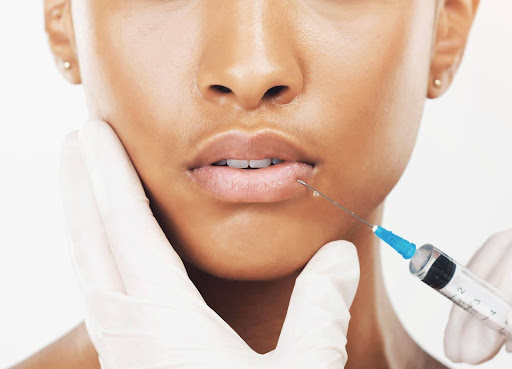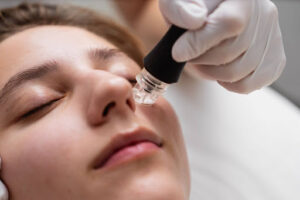Dermal fillers have become one of the most popular non-surgical cosmetic procedures for restoring volume, smoothing lines, and enhancing facial features. But are they a permanent solution? How long can you expect dermal fillers to last? In this article, we explain everything you need to know.
How Long Do Dermal Fillers Typically Last?
Dermal fillers last 6 to 24 months depending on filler type, treatment area, and individual factors like metabolism. Hyaluronic acid fillers like Juvederm and Restylane add instant volume and typically last 6–12 months. Collagen-stimulating fillers like poly-L-lactic acid (such as Sculptra) can last up to 2 years. Lip and mouth areas break fillers down faster.
Request a Personalized Dermal Filler Plan
What Influences How Long Dermal Fillers Last?
The duration of your dermal filler results isn’t fixed—it depends on several factors, including the type of filler used, the area treated, and individual lifestyle and biological factors. Here’s a closer look at what affects filler longevity:
Type of Filler Used
Different filler materials have different lifespans due to their composition and how the body metabolizes them:
- Hyaluronic acid-based fillers like Juvederm and Restylane are among the most popular fillers and are made from a biocompatible substance naturally found in the skin. These gel-like substances typically last 6 to 12 months, depending on the formulation and placement.
- Poly-L-lactic acid fillers, often referred to as biostimulatory fillers, don’t provide instant volume. Instead, they gradually stimulate the natural production of collagen, offering subtle, progressive volume enhancement with results that can last up to 2 years.
- Calcium hydroxylapatite (CaHA) fillers, considered semi-permanent fillers, are denser and designed to treat deeper wrinkles or acne scars. These can last 18 months or longer but are generally used in more targeted areas.
Treatment Area
Where the dermal filler injections are placed plays a significant role in how long they last:
- High-movement areas, such as the lips, marionette lines, and regions around the mouth, experience more frequent facial motion. This leads to a faster breakdown of fillers, so touch-ups may be needed more often.
- In contrast, areas like the nasolabial folds, chin, and jawline tend to hold filler longer because they are more static and experience less muscle movement. These zones often retain volume over time more effectively.
Facial Movements and Individual Metabolism
- If you have a faster metabolism, your body will naturally process and absorb injectable substances more quickly, leading to a shorter period of visible results. This is especially noticeable in active individuals or those with high-energy lifestyles.
- Those with a slower metabolism tend to enjoy longer-lasting results, as the body takes more time to break down the dermal filler products.
- Frequent facial expressions, intense daily activities, or regular use of muscles in the treated area (such as chewing, speaking, or smiling) can also accelerate filler degradation—especially in high-movement areas.
At What Age Do Wrinkles Start to Appear?
How to Extend the Results of Your Dermal Filler Treatment
Maximizing your dermal filler longevity requires a strategic approach—starting with the right provider, followed by proper aftercare and mindful lifestyle choices.
1. Choose a Qualified Provider with Expertise in Facial Anatomy
The longevity and safety of your dermal filler treatment start with your provider. Skilled injectors understand facial anatomy, proper injection sites, and the best techniques for deeper injections to support long-lasting results and avoid complications like injecting into a blood vessel.
2. Protect Your Skin from Excessive Sun Exposure
UV damage can accelerate the breakdown of fillers, particularly in high-movement areas or thinner skin like the lips or tear troughs. Excessive sun exposure also degrades natural collagen production, which is crucial for the longevity of injectable fillers. Apply broad-spectrum SPF daily and avoid tanning beds. Wear hats or seek shade when outdoors for extended periods.
3. Stay Hydrated and Maintain a Healthy Lifestyle
Many filler materials, such as synthetic hyaluronic acid, work best when the skin is hydrated. A healthy diet, adequate water intake, and regular exercise help maintain your results and overall skin health. Reduce alcohol and processed foods, which can promote inflammation and impact your skin’s resilience.
4. Stick to Gentle Daily Activities After Treatment
It is recommended to avoid intense workouts, saunas, or pressure on the treated area for at least 24–48 hours after dermal filler injections. These daily activities can cause dermal filler products to shift before fully settling. If you had lip filler procedures, avoid straws or exaggerated facial movements for the first day.
How Often Should I Get Dermal Filler Injectable Treatments?
At Clinique Face MD, we believe that the key to long-lasting, natural-looking results lies in proactive maintenance and personalized care. Rather than waiting for your results to completely fade, we recommend scheduling touch-up dermal filler injections just before the effects of your previous treatment wear off. This approach helps preserve a smooth, youthful appearance and prevents noticeable fluctuations in facial volume or contour.
General Frequency Guidelines for Dermal Filler Treatments
| Filler Type | Typical Duration | Recommended Maintenance |
| Hyaluronic acid-based fillers | 6–12 months | Every 6–9 months |
| Thicker fillers for volume | 12–24 months | Every 12–18 months |
| Collagen stimulators | Up to 2 years | A series of treatments spaced 6 weeks apart, then yearly maintenance |
| CaHA fillers | 12–18 months | Every 12–15 months |
We design custom treatment plans tailored to your unique skin type, facial structure, age, and lifestyle. Whether you’re addressing fine lines, volume loss, or enhancing features like the lips, cheeks, or jawline, our experienced team is here to guide your journey with subtle, artful enhancements that evolve with you.
Book a Personalized Consultation
Popular Dermal Filler Treatment Options at Clinique Face MD
- Juvederm®: A well-known family of hyaluronic acid-based fillers, Juvederm is used to restore facial volume, smooth smile lines and nasolabial folds, and enhance areas like the lips, cheeks, and chin. It provides instant volume and supports a smoother, more youthful appearance.
- Restylane®: Another trusted line of hyaluronic acid fillers, Restylane is often used for treating facial wrinkles, lip enhancement, and tear trough correction. Its versatility makes it a popular option for addressing both fine lines and volume loss in multiple facial areas.
- Sculptra® (Poly-L-lactic Acid Filler): Sculptra is a collagen-stimulating filler that works gradually to rebuild lost facial volume by boosting the skin’s natural collagen production. It’s ideal for patients seeking long-lasting results through subtle, progressive facial rejuvenation rather than immediate volume.
Sculptra injections in Montreal
Personalized Facial Rejuvenation Treatments in Montreal
At Clinique Face MD, we focus on aesthetic care and facial enhancement through dermal filler treatments designed to restore volume, smooth facial contours, and enhance natural features. Under the direction of Dr. Sami Moubayed, our team tailors each procedure to align with your facial structure and personal goals.
Whether you’re interested in softening fine lines, refining lip shape, or addressing volume loss in areas like the cheeks or jawline, our approach offers natural-looking, lasting results that support a refreshed and confident appearance.






